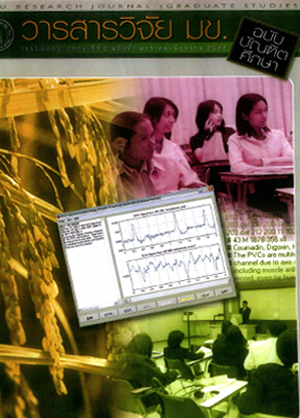Development of Village Health Volunteers Knowledge, Attitude and Behavior toward AIDS using the principles of Action Research in Trainning Process (การพัฒนาความรู้ เจตคติและพฤติกรรมเกี่ยวกับโรคเอดส์ของอาสาสมัครสาธารณสุข ประจำหมู่บ้าน โดยใช้หลักการวิชัยเชิ
Keywords:
action research, AIDS, training processAbstract
The purpose of this research was to study the village health volunteers' knowledge, attitude and behavior toward AIDS using the principles of action research in training process, and people from Ban Nong Nok Kao, Ban Pai Nok Kao and Ban Ta Krang, Tambon Loong Ta Kian , Amphoe Huai Talang , Nakom Ratchasima Province, 2001. The research design was an action research based on Kemmis & Mc Taggart (1992). The steps of research were: planning, acting, observing, reflecting, and re-planning. The results found that using the principles of action research in training process caused the village health volunteers' enthusiasm , enjoyment, sharing opinion by discussion , showing their opinion, accepting the other person 's opinion , and reasonable decision-making . Using the principles of action research in training process helped researcher to improve the activities while activities still be performed and make it be efficient training. The comparison of achievement of knowledge, attitude, and behavior of the volunteers and people from the posttest, there were statistically significant difference from the pretest at 0.05 level
การวิจัยเพื่อการศึกษาผลการนำหลักของการวิจัยเชิงปฏิบัติการมาใช้ในกระบวนการฝึกอบรมเพื่อพัฒนาความรู้ เจตคติและพฤติกรรมเกี่ยวกับโรคเอดส์ของอาสาสมัครสาธารณสุขประจำหมู่บ้าน(อสม.) และประชาชนจากบ้านหนองนกเขา บ้านไผ่นกเขา และบ้านตะแกรง ตำบลหลุ่งตะเคียน อำเภอห้วยแถลง จังหวัดนครราชสีมา ในปี 2544 รูปแบบการวิวจัยเป็นการวิจัยเชิงปฏิบัติการตามแนวคิดของ Kemmis & McTaggart(1992) โดยมีขั้นนตอนการดำเนินนการวิจัยดังนี้ ขั้นวางแผน ขั้นปฏิบัติการ ขั้นสังเกตการณ์ ขั้นสสะท้อนผลการปฏิบัติ และการปรับปรุงแผน ผลการวิจัยพบว่าการใช้หลักการวิจัยเชิงปฏิบัติการในกระบวนการฝึกอบรมทำให้ อสม. มีความกระตือรือร้น สนุกสนานเพลิดเพลิน มีโอกาสในการอภิปรายแลกเปลี่ยนความคิดเห็น กล้าแสดงความคิดเห็น รู้จักยอมรับความคิดเห็นของผู้อื่นและสามารถตัดสินใจอย่างมีเหตุผล การใช้วิจัยเชิงปฏิบัติการช่วยให้ผู้วิจัยสามารถรับรู้ข้อบกพร่อง ระหว่างดำเนินกิจกรรม การฝึกอบรมทำให้สามารถแก้ไข ปรับปรุงสิ่งต่างๆ ได้ ในขณะที่กิจกรรมการอบรมยังดำเนินการอยู่ ทำให้กระบวนการฝึกอบรมดำเนินไปได้อย่างมีประสิทธิภาพ จากการเปรียบเทียบผลสัมฤทธิ์ด้านความรู้ เจตคติ และพฤติกรรมของ อสม. และประชาชน พบว่า ทั้ง อสม. และประชาชนมีความรูม้ เตคติ และพฤติกรรม หลังการฝึกอบรมเพิ่มขึ้นอย่างมีนัยสำคัญทางสถิติที่ระดับ 0.05


